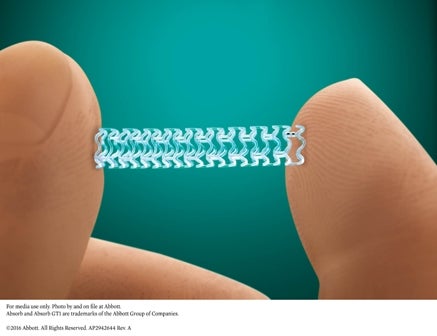Tulsa, OK (August 23, 2016) Oklahoma Heart Institute (OHI) recently became one of the first hospitals in Oklahoma to offer patients with coronary artery disease a new treatment option that literally disappears over time.
Mary Seago of Liberty Mounds, OK, was the first OHI patient to be implanted with the world's first FDA-approved dissolving heart stent. The Absorb bioresorbable vascular scaffold is a major advancement in the treatment of coronary artery disease, which affects 15 million people in the United States and remains a leading cause of death worldwide.
Seago began experiencing chest pains which brought her to the emergency department. Her doctor referred her to OHI where she was implanted with the Absorb stent. “I feel great! I feel like I can do anything I want to,” said Seago. “I would tell someone else considering this procedure to go for it immediately. I think it would change their life.”
While stents are traditionally made of metal, Abbott’s Absorb stent is made of a naturally dissolving material, similar to dissolving sutures. Absorb disappears in about 3 years, leaving only two pairs of tiny metallic markers that remain in the artery to enable a physician to see where the device was placed, after it has done its job of keeping a clogged artery open and promoting healing of the treated artery segment. By contrast, metal stents are permanent implants.
“Just like a cast isn’t needed after a broken bone heals, once a stent has done its job of opening an artery to allow proper blood flow, it is no longer necessary,” said Wayne Leimbach, M.D., director of the Cardiac and Interventional Laboratories and medical director of Oklahoma Heart Institute Hospital at Hillcrest Medical Center.
“The introduction of an absorbable stent marks the next generation of interventional cardiology, and we at Oklahoma Heart Institute are proud to have been selected as one of the 75 trial sites across the United States to offer this groundbreaking technology that provides a new treatment option for our patients with coronary artery disease,” said Leimbach.
OHI’s interventional cardiology team underwent extensive training on the new device, as the technique for implantation of the Absorb stent varies from that of the traditional metal stent.
With the addition of the Absorb stent, Oklahoma Heart Institute offers the most comprehensive treatments for patients with coronary artery disease available in the state, including:
• The WATCHMAN™ Implant, a safe alternative to long-term warfarin therapy to help reduce stroke risk in patients with atrial fibrillation;
• TAVR (transcatheter aortic valve replacement), a minimally invasive replacement of the aortic valve done in the Cath Lab, which is now available for patients classified as intermediate risk as well as high risk; and
• MitraClip, a non-surgical, transcatheter repair of leak mitral valves.
OHI is the only hospital in Oklahoma currently offering these four interventions.
For more information on the Absorb stent and the treatments available at Oklahoma Heart Institute, visit oklahomaheart.com or call 918-592-0999.

